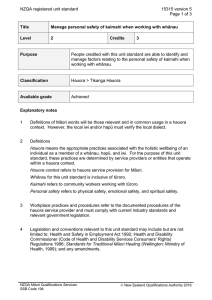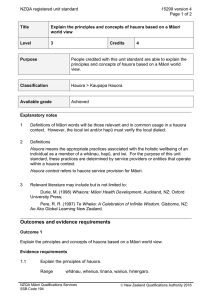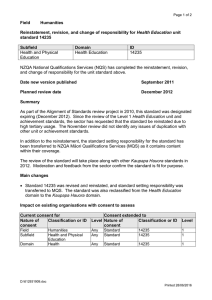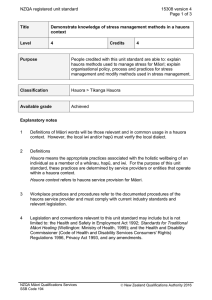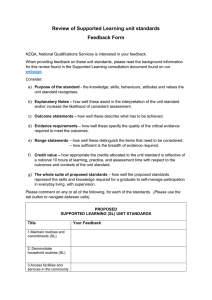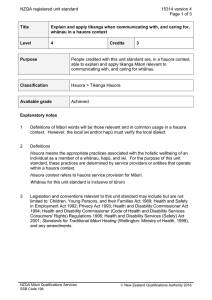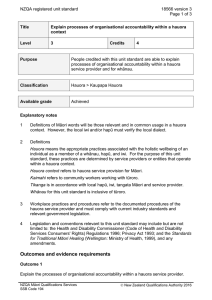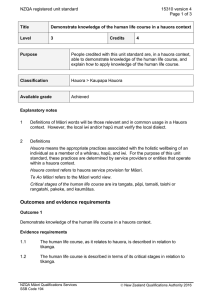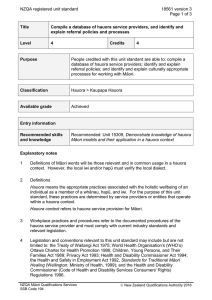NZQA registered unit standard 15300 version 4 Page 1 of 3
advertisement
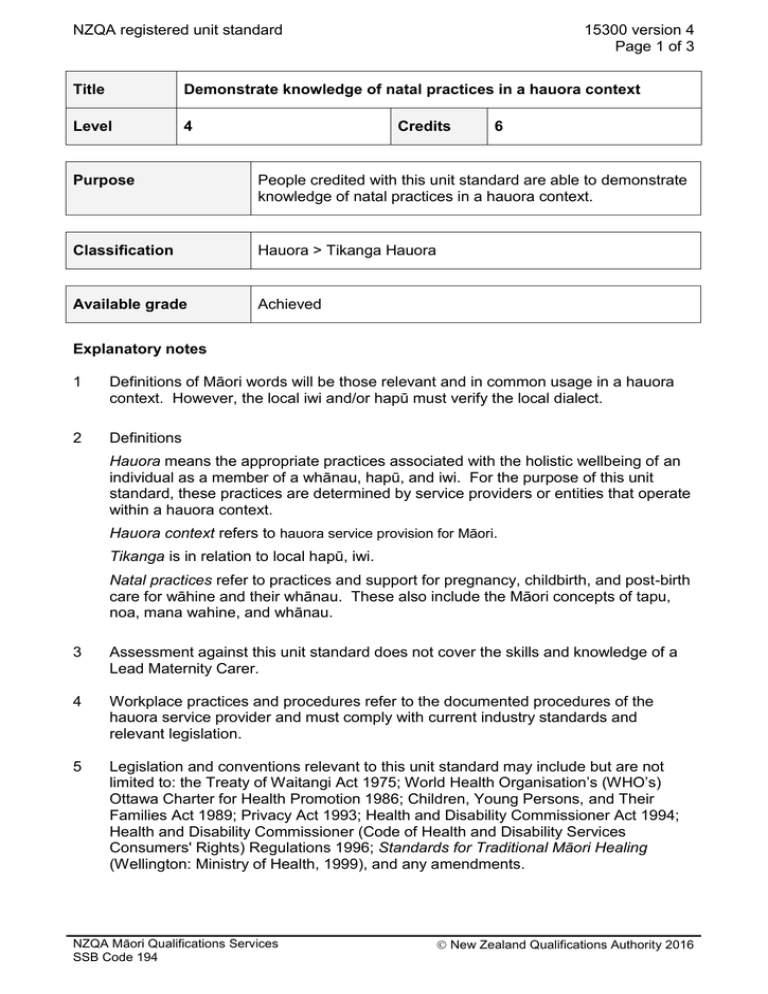
NZQA registered unit standard 15300 version 4 Page 1 of 3 Title Demonstrate knowledge of natal practices in a hauora context Level 4 Credits 6 Purpose People credited with this unit standard are able to demonstrate knowledge of natal practices in a hauora context. Classification Hauora > Tikanga Hauora Available grade Achieved Explanatory notes 1 Definitions of Māori words will be those relevant and in common usage in a hauora context. However, the local iwi and/or hapū must verify the local dialect. 2 Definitions Hauora means the appropriate practices associated with the holistic wellbeing of an individual as a member of a whānau, hapū, and iwi. For the purpose of this unit standard, these practices are determined by service providers or entities that operate within a hauora context. Hauora context refers to hauora service provision for Māori. Tikanga is in relation to local hapū, iwi. Natal practices refer to practices and support for pregnancy, childbirth, and post-birth care for wāhine and their whānau. These also include the Māori concepts of tapu, noa, mana wahine, and whānau. 3 Assessment against this unit standard does not cover the skills and knowledge of a Lead Maternity Carer. 4 Workplace practices and procedures refer to the documented procedures of the hauora service provider and must comply with current industry standards and relevant legislation. 5 Legislation and conventions relevant to this unit standard may include but are not limited to: the Treaty of Waitangi Act 1975; World Health Organisation’s (WHO’s) Ottawa Charter for Health Promotion 1986; Children, Young Persons, and Their Families Act 1989; Privacy Act 1993; Health and Disability Commissioner Act 1994; Health and Disability Commissioner (Code of Health and Disability Services Consumers' Rights) Regulations 1996; Standards for Traditional Māori Healing (Wellington: Ministry of Health, 1999), and any amendments. NZQA Māori Qualifications Services SSB Code 194 New Zealand Qualifications Authority 2016 NZQA registered unit standard 15300 version 4 Page 2 of 3 Outcomes and evidence requirements Outcome 1 Demonstrate knowledge of natal practices in a hauora context. Evidence requirements 1.1 Antenatal practices are explained in relation to tikanga. 1.2 Post-birth care practices are explained in relation to tikanga. 1.3 The post-natal care of the whenua is described in relation to tikanga. Outcome 2 Support natal practices in a hauora context. Evidence requirements 2.1 Antenatal practices are supported in accordance with workplace practices and procedures. 2.2 Post-birth care practices are supported in accordance with workplace practices and procedures. Planned review date 31 December 2020 Status information and last date for assessment for superseded versions Process Version Date Last Date for Assessment Registration 1 23 October 1998 31 December 2012 Review 2 18 December 2002 31 December 2012 Review 3 20 August 2010 31 December 2017 Review 4 10 December 2015 N/A Consent and Moderation Requirements (CMR) reference 0165 This CMR can be accessed at http://www.nzqa.govt.nz/framework/search/index.do. Please note Providers must be granted consent to assess against standards (accredited) by NZQA, before they can report credits from assessment against unit standards or deliver courses of study leading to that assessment. Industry Training Organisations must be granted consent to assess against standards by NZQA before they can register credits from assessment against unit standards. NZQA Māori Qualifications Services SSB Code 194 New Zealand Qualifications Authority 2016 NZQA registered unit standard 15300 version 4 Page 3 of 3 Providers and Industry Training Organisations, which have been granted consent and which are assessing against unit standards must engage with the moderation system that applies to those standards. Requirements for consent to assess and an outline of the moderation system that applies to this standard are outlined in the Consent and Moderation Requirements (CMR). The CMR also includes useful information about special requirements for organisations wishing to develop education and training programmes, such as minimum qualifications for tutors and assessors, and special resource requirements. Comments on this unit standard Please contact the NZQA Māori Qualifications Services mqs@nzqa.govt.nz if you wish to suggest changes to the content of this unit standard. NZQA Māori Qualifications Services SSB Code 194 New Zealand Qualifications Authority 2016

